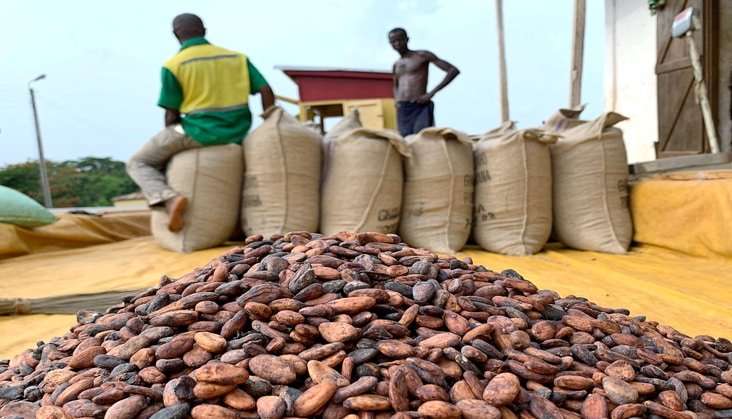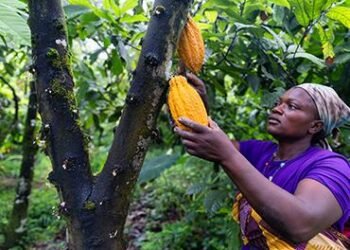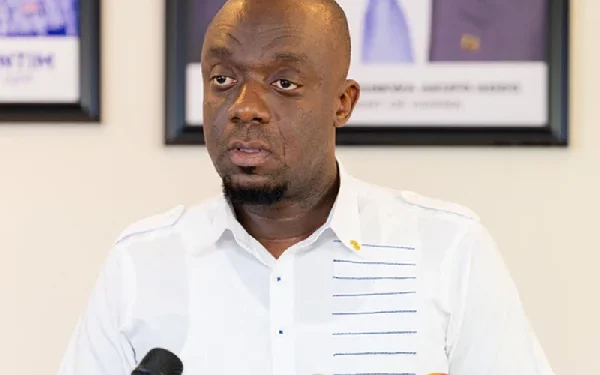Ghana, one of the world’s leading cocoa producers, faces a significant setback in cocoa production for the 2023/24 season, with output projected to drop by a staggering 40%.
This revelation, reported by sources within Ghana’s cocoa sector regulator, COCOBOD, paints a concerning picture for the global cocoa market, driving prices to unprecedented levels.
Several factors have converged to precipitate this decline. Adverse weather conditions, characterized by strong seasonal winds and inadequate rainfall, have dealt a severe blow to cocoa cultivation. Additionally, the scourge of smuggling activities, illegal gold mining, and the pervasive spread of swollen shoot disease have further compounded the challenges faced by cocoa farmers.
The impact of these factors is palpable. COCOBOD anticipates cocoa production for the season to hover around 500,000 metric tons, falling drastically short of the targeted 820,000 metric tons. Expressing dismay over the situation, a source informed Reuters that immediate remedies to address the decline are elusive, given the nature of the challenges.
This decline is not an isolated incident but rather part of a concerning trend. In the preceding 2022/23 season, COCOBOD reported a loss of approximately 150,000 tons of cocoa to smuggling and illegal gold mining activities, locally known as galamsey.
Moreover, the relentless spread of the cocoa swollen shoot virus has ravaged an estimated 500,000 hectares of cocoa farmlands, exacerbating the production woes.
Efforts to counteract these challenges are underway, albeit with uncertain outcomes. COCOBOD has initiated farm rehabilitation programs and intensified collaboration with security agencies to stem the tide of smuggling. The onset of the rainy season also offers a glimmer of hope for improved yields in the coming months.
Despite these efforts, the outlook remains precarious. Optimism about Ghana’s potential for production recovery is tempered by the absence of official comments from COCOBOD on the matter. The threat of declining cocoa production looms large, casting a shadow over the global cocoa market.
Repercussions of Ghana’s Cocoa Production Woes
The repercussions of Ghana’s cocoa production woes resonate across the globe, driving cocoa prices to historic highs. London cocoa futures have breached the £5,000 mark, while New York cocoa prices have surged past $6,000. Traders grapple with heightened demand and pricing volatility, while chocolate manufacturers brace for the impact on consumer demand.
Indeed, the ripple effects are already being felt in retail markets, with industry giants like Hershey anticipating a slowdown in consumer demand as cocoa prices escalate. Samuel Adimado, President of Ghana’s cocoa buyers group, laments the dire forecast, noting that member firms are compelled to adapt their operations to navigate these turbulent times.
As cocoa prices soar, the allure of profit has heightened smuggling activities, exacerbating the challenges faced by cocoa-producing nations like Ghana. Urgent action is imperative to safeguard the livelihoods of cocoa farmers and preserve the integrity of the global cocoa supply chain. Only through concerted efforts and strategic interventions can the industry weather this storm and emerge resilient in the face of adversity.
Amidst the gloomy forecast, stakeholders within the cocoa industry must band together to explore innovative solutions and implement sustainable practices. Collaborative research efforts could yield breakthroughs in disease-resistant cocoa varieties, offering hope for long-term resilience against prevalent threats like the cocoa swollen shoot virus.
Moreover, investments in infrastructure and technology could enhance productivity and efficiency across the cocoa value chain, empowering farmers to withstand external shocks and secure their livelihoods. Additionally, robust regulatory frameworks and heightened enforcement measures are essential to curb illicit activities and safeguard the integrity of cocoa production.
By fostering a collective commitment to sustainability and resilience, the cocoa industry can traverse the current challenges and chart a course towards a more prosperous and sustainable future.
READ ALSO: Africa-Focused Energy Trader Mocoh Establishes Biofuels Division





















